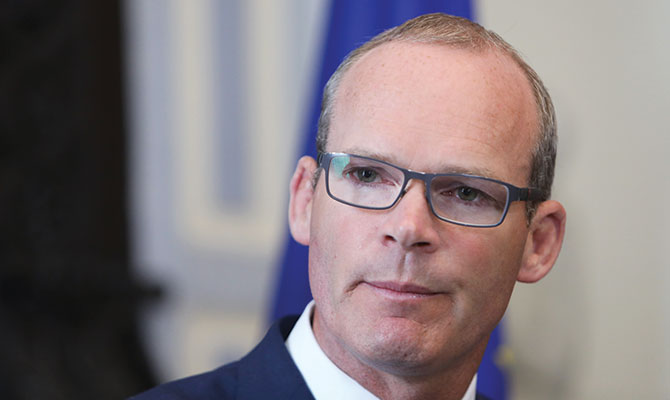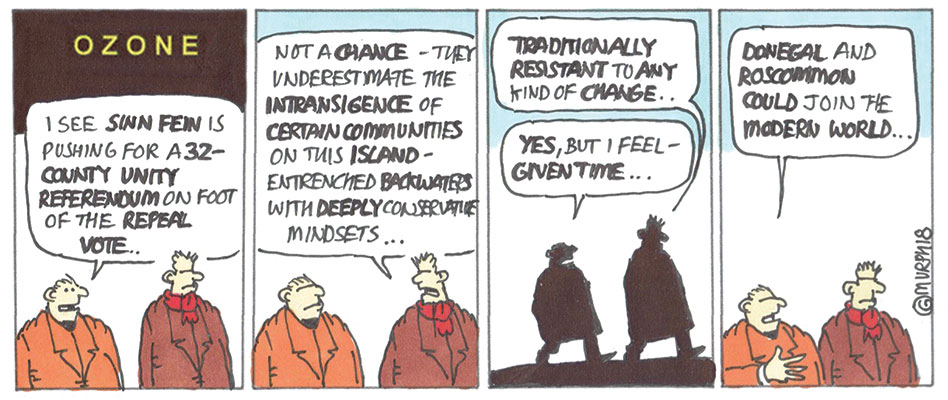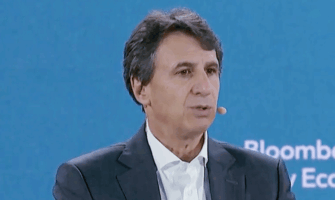
Simon Coveney
THE rhetorical statements from An Taoiseach and the Foreign Minister – Leo Varadkar and Simon Coveney respectively – on the murderous Israeli behaviour in Gaza were more than a little disingenuous as a study of EU differences on Israel indicates.
Coveney’s ‘dressing down’ of the Israeli ambassador was presented by his PR handlers and the media as a sign of the government’s independent foreign policy and the anger of Irish voters. In fact, there was nothing in Coveney’s actions that contradicted EU policy as enunciated after US president Donald Trump stated his intention to move the US embassy to Jerusalem last year. And when Varadkar (a former member of the Oireachtas Friends of Israel) boasted of how he had personally predicted the embassy move would result in violence he was merely echoing an EU policy response to Trump’s announcement.
But when Independent Alliance minister Finian McGrath demanded at cabinet that the government implement its own policy – as in the programme for government – in recognising Palestinian statehood, he was met with Coveney’s own wailing brick wall. The Irish Times reported that the programme states such recognition would only take place “once” a lasting peace settlement occurred. What it actually says is that recognition would occur “as part of a lasting settlement”. This does not mean such recognition has to wait for the final conclusion of such a settlement. If that were intended the 2016 government programme statement would be meaningless as nobody believed then or now that a resolution to the 70-year conflict was imminent.
Adherence to EU policy on the Middle East is the last resort of ministers when pressed and the EU or most of the big players (France, Germany, Britain etc) have resisted Palestinian recognition with the Irish government tamely following suit. But EU policy on Trump’s US embassy was flouted by three EU countries recently and there was no diplomatic upheaval within the EU. Hungary, Romania and the Czech Republic opposed a planned EU statement condemning the US embassy move and unlike most EU countries their representatives, along with those of Austria, attended a gala celebrating the embassy opening in Jerusalem.
Even more provocative – by comparison with Ireland’s supine behaviour in the face of supposed EU foreign policy consensus – the three countries blocked a statement from the EU condemning the US embassy move. France had led the way in mobilising support from the big EU governments for such a statement but the central European countries refused to sanction it. Subsequently, Romania and the other countries allowed Federica Mogherini, High Representative of the EU for Foreign Affairs and Security Policy, to issue a watered down statement. Are only pro-Israeli EU states allowed to divert from EU foreign policy and do Coveney and Varadkar not have the same leeway or independence of foreign policy preferences? Remarkably, following the Gaza slaughter and perhaps in deference to the three dissenting states, Mogherini issued a statement on behalf of the EU in which she called for “restraint on both sides”. If the Irish government disagreed with this pusillanimous statement it did not say so.
McGrath negotiated the foreign policy section of the government programme and is unlikely to drop the issue of Palestinian statehood. But Fianna Fáil and Sinn Féin rather than his cabinet colleagues now appear to be his target audience. TDs in both parties have been approached to mobilise and push for Palestinian statehood, a policy they say they support. If the two parties combine on this issue (would Micheál Martin countenance such a pact?) then a joint motion would be passed by the Dáil. And Minister McGrath – presumably with the support of the other three Alliance ministers – would break ranks to support it, causing no little tension in government.





















